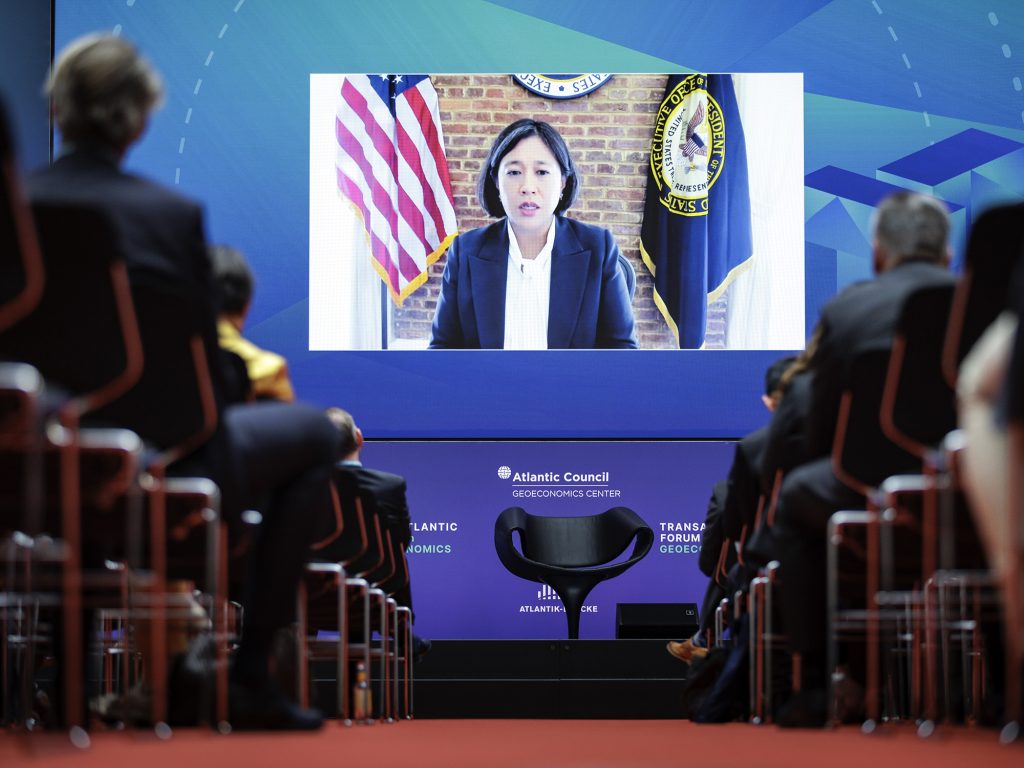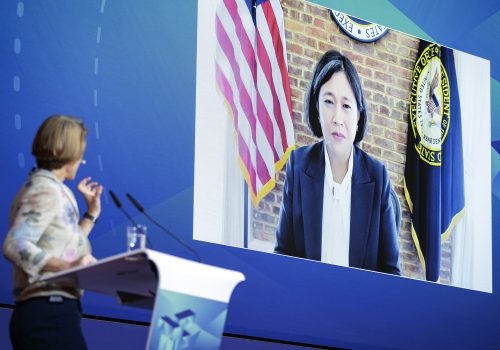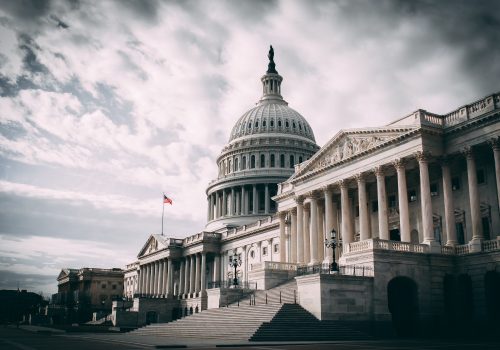Watch the full event
The United States signaled its support for the European Union (EU) in its anti-subsidy probe against China on Friday, as Europe asserts that Beijing has flooded global markets with electric cars at prices artificially driven down by state subsidies.
“This is one of the ways in which the EU is waking up to the fact that global trade today is not happening on a level playing field, and therefore there are things that we market-based democratic economies need to do in order to defend our interests and to defend the space to have fair and free trade,” US Trade Representative Katherine Tai said while speaking at the 2023 Transatlantic Forum on GeoEconomics in Berlin, hosted by the Atlantic Council and Atlantik-Brücke.
Tai referenced the importance of managing the US-China relationship on numerous occasions in the half-hour discussion with moderator Stephanie Flanders, the senior executive editor for economics at Bloomberg News.
“It is one of our most profound responsibilities,” Tai said. “At the core of this exercise, is that the US and the Chinese economies, for their size and their weight and significance in the world economies, are very structurally different, based on very different philosophical underpinnings. And so the issue—of how we can achieve a coexistence that can be productive and constructive for the world—is not an easy question.”
Read on for more highlights from their conversation.
On the European Union
- Tai said that the US and EU are “linking arms” to take on challenges around the global marketplace, as their 2021 steel and aluminum agreement is poised to expire if a new deal isn’t struck by the end of October. The new deal aims to address global market distortions and “the negative impacts to our producers that come from nonmarket excess production and capacity—so, unfair trade,” Tai said.
- She also said the Biden administration is working with the EU to create more incentives for cleaner energy production globally, not just in Europe and the United States. “If you are producing as cleanly as we are, based on our metrics and our data, then the concept is that you will have easier access into our markets,” Tai said. “The more fairly you are producing your steel and aluminum, again, the more we treat you the way that we will be treating each other.”
- Tai projected optimism that a deal will be struck. “This is one of the most consequential engagements and negotiations that we are engaged in, one of the most important between the US and the EU, and I remain very hopeful that we will have something to show the rest of the world in the next six-week period.”
On China
- Last year, the United States announced that it would review the impact of the Trump administration’s Section 301 tariffs against China, taking in around 1,500 public comments to weigh in on the tariffs’ effectiveness and the possible effects of their continuation. Tai said the administration’s goal was to “wrap this up hopefully by the end of this year.”
- Flanders pointed to an interview she had conducted earlier this year with Michael Froman, who served as US trade representative in the Obama administration. When China joined the World Trade Organization in 2001, Froman said, there was the expectation that China would “become more like us,” but “instead we have become more like them—focused on subsidies, playing one country against another, state-directed investments in different sectors.”
- When asked about that characterization from her predecessor, Tai said “I don’t think that’s fair.” She argued that “the global economy, the terms of competition have changed, and we need to adapt. We’re not trying to embrace the Chinese model; we’re trying to embrace a model that stays true to our market orientation, to our democratic principles, that is going to allow us to compete.”
- While Tai has yet to meet Chinese Vice Premier He Lifeng since he took over the key finance post in March, she said the strength of the US-China relationship shouldn’t be measured by the number of stakeholder visits between the world’s two largest economies. “The most important thing is whether or not we are communicating,” Tai said. “It’s less about the active visiting and more about the substance of the engagement. I have, from the very beginning, stood by my openness to engage with my counterparts in Beijing.”
On the TTC
- Tai said she believed the US-EU Trade and Technology Council (TTC) has already proven itself to be valuable since being launched in June of 2021, noting that it played a key role when Russia invaded Ukraine and will continue to be another critical economic lever. “This structure of communication and relationships that we had built through the TTC … immediately facilitated the ability for the US and the EU to coordinate its response on the economic side.”
- The United States plans to host the next TTC meeting “sometime this fall,” Tai said. “And with all of the challenges that we continue to face, I expect it to continue to serve a great deal of our transatlantic interests.”
Nick Fouriezos is a writer with more than a decade of journalism experience around the globe.
Watch the full remarks
Further reading
Fri, Sep 22, 2023
US Trade Representative Katherine Tai: ‘Global trade today is not happening on a level playing field’
Transcript By
At the Transatlantic Forum on GeoEconomics, US Trade Representative Katherine Tai unpacked the latest news in US-EU trade relations.
Wed, Sep 20, 2023
The US, EU, and UK need a shared approach to economic statecraft. Here’s where to start.
Report By
The economic statecraft landscape is becoming more complex as transatlantic partners increasingly leverage the tools to counter transnational threats. There is a growing need to understand how these tools are used, by whom, and when, as well as their intended and real impacts worldwide.
Mon, Aug 7, 2023
A year after the IRA, industrial policy has gone global. Now what?
EnergySource By David L. Goldwyn, Andrea Clabough
The domestic impacts of the IRA are undeniable. It is less certain what it means for the global energy transition. One year later, officials must prioritize opportunities to align with like-minded allies overseas.
Image: US Trade Representative Katherine Tai speaks at the Transatlantic Forum on GeoEconomics in Berlin on September 22, 2023.




